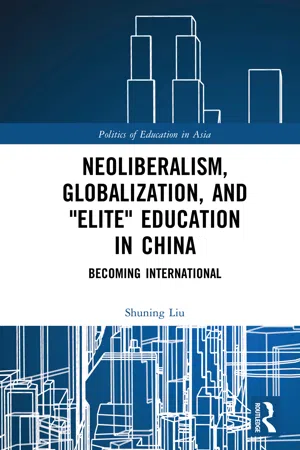
Neoliberalism, Globalization, and "Elite" Education in China
Becoming International
- 196 pages
- English
- ePUB (mobile friendly)
- Available on iOS & Android
About This Book
This book examines the practices and effects of emerging international curriculum programs established by Chinese elite public high schools and supported by China's New Curriculum Reform and the Chinese-Foreign Cooperation in Running Schools (CFCRS) policy. Drawing on critical theory, the book applies sociological and anthropological approaches to the study of the educational practices of such curriculum programs and the rising Chinese elite class, as well as educational policy globally. Through analyzing a wide variety of data sources, this book focuses on examining how changing local and global contexts have influenced and shaped the educational opportunities, experiences, and aspirations of privileged urban Chinese students who are able to attend these programs and who hope to study at U.S. universities. In doing so, the book is intended to define the problematics of the internationalization of Chinese education and an emergent form of elite education in China, which are complex and embedded in the process of modernization in China.
Neoliberalism, Globalization, and "Elite" Education in China: Becoming International will appeal to undergraduates, postgraduates, and academics in the fields of curriculum studies, educational policy studies, sociology of education, and anthropology of education, as well as policymakers with an interest in globalization and education, education policy, and education and international development.
Frequently asked questions
Information
Table of contents
- Cover
- Half Title
- Series Page
- Title
- Copyright
- Contents
- List of illustrations
- Series editors’ foreword
- Acknowledgments
- 1 Introduction
- 2 Neoliberalism, globalization, and “elite” education in China
- 3 The setting: the rise of neoliberalism in Chinese educational reforms
- 4 Neoliberal global assemblages: the emergence of “public” international high-school curriculum programs in China
- 5 “New” parental choice of school in China?: the choice of international high-school curriculum programs
- 6 A new form of elite schooling: preparation for U.S. college application, privilege, and power
- 7 The educational consulting industry: informal schooling and the making of neoliberal subjects
- 8 Conclusion and implications
- Epilogue: reflection on positionality and research design
- References
- Index